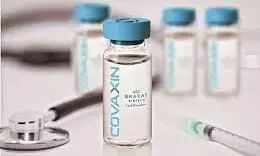
Study on covaxin side-effects retracted, journal cites lack of confidence in findings
text_fieldsA study exploring the safety of Covaxin, India’s indigenous COVID-19 vaccine, has been retracted by the journal Drug Safety due to concerns over the validity of its conclusions.
The paper, authored by researchers from Banaras Hindu University (BHU), previously led to media reports claiming that over 33% of recipients experienced adverse reactions after receiving the vaccine.
The retraction, issued on September 24, followed a review that cast doubt on the study's findings. In a formal retraction notice, the editor and the publisher, Springer Nature, expressed "no confidence" in the conclusions drawn by the study.
According to the journal, a post-publication review determined that the reported adverse events of special interest (AESIs) were presented in a way that could be misinterpreted, potentially leading to ambiguous conclusions about the relationship between Covaxin and the side effects observed.
The retraction came amid a public outcry and significant media attention surrounding the study.
Some reports had inaccurately suggested that Covaxin caused serious side effects in one-third of its recipients. The retracted study did report AESIs, such as alopecia (hair loss), respiratory infections, typhoid fever, hypothyroidism, and Guillain-Barré syndrome (a nerve disorder), with four deaths recorded among the vaccinated individuals.
However, the study did not explicitly confirm a causal link between the vaccine and these adverse events, a critical detail that was often overlooked in public interpretations.
The authors of the paper expressed their disagreement with the retraction. However, their concerns were overridden by the journal’s adherence to the guidelines set by the Committee on Publication Ethics (COPE), which govern the investigation and resolution of issues arising from published research.
The retraction occurred on the same day that a group of over 600 citizens, including medical professionals, researchers, and social activists, published an open letter urging the journal not to retract the study. The signatories argued that the media misrepresented the study’s findings and called attention to the ethics and rigor of the research, which had been approved by BHU's Institutional Ethics Committee.
The Indian Council of Medical Research (ICMR) had raised concerns about the study as early as May 2024, pointing out potential flaws in the methodology, including the possibility of recall bias due to the year-long gap between vaccination and data collection. The ICMR also noted that the researchers failed to record pre-existing conditions among participants, which could have influenced the study's outcomes.
Critics have also pointed to Bharat Biotech, the manufacturer of Covaxin, for its lack of transparency regarding the vaccine's phase-3 trial data. While interim results were published in 2021, the final results and comprehensive safety data remain unavailable, raising further concerns about the rushed rollout of the vaccine in early 2021.
Bharat Biotech has initiated a defamation lawsuit against the researchers for Rs 5 crore, a move that has sparked controversy within the scientific community.
Despite the retraction, the authors and their supporters continue to defend the study, calling for more robust post-marketing surveillance of vaccines to ensure public health and safety.






















